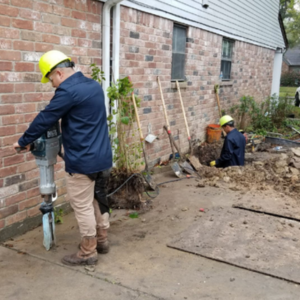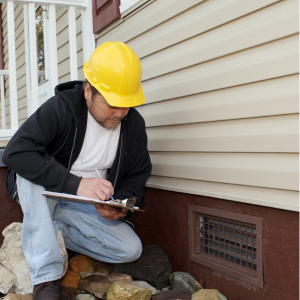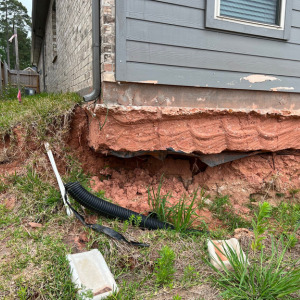
Maryland Home Sales: Challenges of Selling with Foundation Issues
Are you convinced your house is now worthless because of the cracks you saw on the foundation? Relax! You’re not about to become homeless, and your retirement fund isn’t going down the drain. Foundation problems feel scary because they sound expensive, but they are very common in Maryland. Some buyers love them because they know they’re getting a deal and aren’t afraid of a bit of work.
Contact us today for a fair, no-obligation offer on your house, even if it has foundation issues.
How Common Are Foundation Problems in Maryland?
About one in four homes over 30 years old has some foundation issues. You’re not the only one staring at cracks in your basement wall, wondering what happened. In fact, contractors around here stay busy with foundation calls pretty much year-round.
Maryland‘s soil conspires against your foundation. We’ve got clay that swells and shrinks like a sponge, sandy areas that shift around, and all those freeze-thaw cycles that crack everything. The Chesapeake Bay region makes things even trickier with water table changes that mess with foundations year after year.
Common Signs of Home Foundation Issues in Maryland
Foundation problems sneak up on you: they don’t just announce themselves with crashes. Most of the time, your house starts acting weird in small ways that are easy to brush off at first. Here are some warning signs you should be aware of.
Interior Warning Signs
Your house is trying to tell you something with doors that stick, windows that won’t open, and cracks zigzagging across your walls.
Other dead giveaways that something’s shifting underneath are slightly sloped floors or gaps between your baseboards and the floor.
That musty smell in your basement or white chalky stuff on the walls usually means water is getting through foundation cracks you haven’t spotted yet.
Exterior Foundation Problems
Walk around your house and look for cracks in the foundation walls, especially those step-pattern ones that look like tiny stairs. If your foundation looks like it’s pulling away from the house or your chimney is doing its own leaning tower impression, that’s your cue to call someone who knows what they’re looking at.
Water pooling next to your foundation after rain is another red flag that’ll cause problems if you ignore it.
Can You Sell a House with Foundation Problems in Maryland?
Yes, you can sell your house with foundation problems. This happens every single day in Maryland. Sure, you might not get as many people banging on your door, but the buyers who show up are usually serious and ready to make deals. You just have to be realistic about your expectations and honest about what you’re dealing with.
Your biggest challenge won’t be finding buyers. It’ll be dealing with their lenders. Most traditional mortgages get nervous around foundation issues, so you’ll probably work with cash buyers or investors more often than first-time homebuyers with FHA loans.
But honestly, cash buyers move faster and cause way fewer headaches anyway.
How Do Foundation Issues Affect Your Home’s Value
Foundation problems typically knock 10 to 15 percent off your home’s value, sometimes more if the damage looks scary. A $300,000 house could lose $30,000 to $45,000 in value, which sounds awful until you realize that’s often less than what major repairs actually cost.
You need to price your house right from the start instead of trying to pretend the problems don’t exist.
Your local market matters a lot here. If foundation issues are super common in your neighborhood, buyers expect them and automatically factor repair costs into their offers.
But if you’re the only house on the block with problems, you might face steeper discounts because buyers have other options that don’t need work.
The Direct MD Cash Buyers team makes fair offers on houses with foundation issues, so you can sell quickly without stressing over costly repairs or steep discounts.
Should You Repair Foundation Problems or Sell As-Is?
This is the biggest question that keeps you up at night, right? The answer depends on how much cash you have sitting around, how fast you need to move, and how much stress you can handle.
Some people love managing contractors and timelines, while others would rather eat glass than deal with construction headaches.
If you can swing the upfront costs and you’re not in a rush, repairs might get you more money. But foundation work often uncovers other problems you didn’t know about, and those “quick” two-week projects can stretch into months.
On the flip side, selling as-is means you’re done with the whole mess right now, even if it costs you some cash.
Foundation Repair Costs in Maryland

Foundation repairs in Maryland typically cost between $2,200 and $8,100, with most homeowners spending around $5,100. But don’t get too comfortable with those numbers.
If your house decides to address its foundation issues seriously, serious structural work can easily cost $20,000 or more.
Minor Crack Repairs
Small cracks that can be sealed with epoxy or hydraulic cement usually cost between $250 and $800. These easy wins will make you feel like a home repair genius for about five minutes.
House Settlement and Sinking
When your house starts sinking or settling unevenly, it will cost $5,000 to $25,000 to fix it properly.
Contractors might use foundation piers or mudjacking to get everything level again. Both sound scarier than they actually are.
Bowing Foundation Walls
Walls bowing inward from soil pressure need serious attention. Depending on the condition, they typically cost $4,000 to $12,000.
This usually involves carbon fiber strips, steel reinforcement, or installing anchor systems to hold everything in place.
How to Sell a House with Foundation Problems in Maryland
To sell your house, you’ve got some work to do first, but it’s not as complicated as it sounds.
Step 1: Get a Professional Foundation Inspection
Don’t just trust your brother-in-law who “knows about construction.” Hire a licensed structural engineer to give you the real story.
This inspection costs a few hundred bucks but gives you the advantage of pricing your house correctly and confidently answering buyer questions.
Step 2: Understand Maryland’s Disclosure Requirements
Maryland Law says you must tell buyers about known defects; foundation problems definitely count. Trying to hide these problems is a great way to end up in court later.
Buyers will find out during their inspection anyway, so you might as well get ahead.
Step 3: Choose Your Selling Strategy
Next, you must commit to fixing everything or selling the house exactly as it is.
Both options can work for you, but they require different approaches to pricing, marketing, and dealing with buyers.
Sell After Making Repairs
You fix everything, get warranties, and then list your house like any other move-in-ready property. This approach usually gets you more money and attracts traditional buyers with conventional financing.
However, you’ll need cash upfront and patience for construction delays. Make sure you keep every receipt and document the work properly.
Remember that buyers need proof that repairs were done right.
Sell a House with Foundation Problems in Maryland As-Is
You price the house to reflect the needed repairs and market directly to cash buyers, investors, or a cash for houses company in Maryland who aren’t scared of a bit of work.
This gets you out fast without the headache of managing contractors, but you’ll definitely take a hit on the final sale price. Just be honest in your listing and have repair estimates ready to show serious buyers.
Maryland Disclosure Laws

Maryland requires you to tell buyers about every problem you know about, including foundation issues. Don’t play dumb or hide cracks behind fresh paint; that’s a one-way ticket to lawsuit city.
The state’s disclosure form asks specific questions about structural problems. Lying on it can bite you years later when buyers discover what you knew.
You need your disclosure paperwork because it protects you legally and shows buyers you’re not trying to pull a fast one. Attach those engineer reports, repair estimates, and photos of the damage right to your disclosure.
Buyers respect sellers who lay everything out instead of making them guess what’s wrong.
How to Find the Right Buyers for Your Property
Young couples with babies and picket fence dreams will not buy your foundation project house. You need buyers who get excited about discounted properties and have cash burning holes in their pockets.
Real estate investors see dollar signs where regular buyers see disasters. They move fast because they understand that time equals money in this business.
Start contacting local real estate investment groups, posting in landlord Facebook groups, and contacting companies that buy houses for cash. These people buy multiple properties every month and will not faint when they see foundation cracks.
They’ve probably fixed worse problems than yours and made good money.
How to Negotiate with Potential Buyers
Buyers will use your foundation problems as an advantage to push your price down even further than it should go. Before negotiations, you should arm yourself with detailed repair estimates and know your bottom line.
Handle Inspection Contingencies
Every buyer wants an inspection period to poke around and find more problems they can use against you. Let them look all they want. You’ve already disclosed the foundation issues, so they can’t act shocked when their inspector confirms what you told them.
Set a reasonable inspection period, but don’t let buyers drag it out for weeks while they shop around for more excuses to renegotiate.
Seller Concessions and Repair Credits
Buyers love asking for credits at closing so they can handle repairs themselves after they own the house. This works great because you don’t have to manage contractors or worry about warranty issues.
Just knock some money off the price and let them deal with the headaches. Keep concessions reasonable and tied to repair costs, not whatever random number the buyer throws out.
Why Cash Buyers May Be Your Best Option
You’re probably exhausted from worrying about this foundation mess and want it over. Cash house buyers in Silver Spring and surrounding cities in Maryland get that. They’re not going to put you through months of stress while some loan officer decides whether your house is “worthy” of their precious mortgage money.
They simply show up, see your house for what it is, and either want it or they don’t.
You’ll feel relieved when a cash buyer says, “Yes, we’ll take it.” You won’t be checking your phone every hour, wondering if their financing fell through or dealing with appraisers who act like your foundation cracks are the end of civilization.
Cash buyers have seen it all. They come prepared for problems and close when they say they will. This will feel like a miracle when you’ve been stressed about this house for months.
What Causes Foundation Problems in Maryland Homes?

Maryland‘s geography sets your house up for foundation issues from day one. Between the weird soil conditions, crazy weather patterns, and decades of questionable construction practices, it’s actually surprising more houses don’t have foundation problems.
Clay Soil Issues in Central Maryland
Central Maryland is built on heavy clay soil that acts like a giant sponge. It swells when wet and shrinks like crazy when it dries out.
Your foundation rides this roller coaster of soil movement yearly; eventually, something has to give. The clay under your house can give out when we get those heavy spring rains followed by hot, dry summers.
Sandy Soil Problems on the Eastern Shore
The Eastern Shore has the opposite problem with sandy soil that drains so fast it can wash away from under your foundation during heavy storms.
Sandy soil also doesn’t provide the same solid support as other soil types, so houses settle unevenly over time.
Add in the fact that many Eastern Shore homes were built on filled wetlands, and foundation movement can really surprise you decades after construction.
Water Table Changes Near the Chesapeake
Living near the Chesapeake Bay means dealing with water table fluctuations that most inland homeowners never consider.
When water levels rise during wet seasons or storms, the extra pressure pushes against foundation walls from the outside. Meanwhile, when levels drop during dry periods, soil can shift and leave gaps that let your foundation settle into new positions it was never meant to be in.
Poor Construction Practices from the 1970s-80s
Houses built during Maryland‘s construction boom in the 1970s and 1980s often have issues that return to haunt current homeowners.
At the time, contractors sometimes skipped proper soil compaction, used substandard materials, or didn’t account for Maryland‘s specific soil and water challenges.
Many of these homes are reaching the 40— to 50-year mark, when foundation problems typically begin to appear. This explains why so many Maryland homeowners are dealing with this.
Insurance and Foundation Problems: What You Need to Know
Your homeowner’s insurance policy probably will not help much with foundation problems, which is annoying but unsurprising. Insurance companies wrote policies to avoid paying for expensive structural work that takes decades to develop.
What Your Homeowner’s Insurance Will (and Won’t) Cover
Standard homeowner’s insurance typically covers sudden, unexpected disasters, such as fires, storms, and burst pipes, rather than gradual problems that develop over time.
Foundation settling, cracking due to soil movement, or developing leaks from normal wear and tear won’t trigger a payout from your insurance company.
However, if a covered disaster like a major storm or plumbing emergency directly causes foundation damage, you might have a claim worth filing.
Don’t get your hopes up, though. Insurance adjusters are experts at finding reasons why foundation problems were “pre-existing” or caused by maintenance issues rather than covered events.
Getting Insurance After Foundation Repairs
Once you fix your foundation problems, getting insurance for the repaired work is not hard as long as you used licensed contractors and have proper documentation.
Most insurance companies will cover properly repaired foundations like any other part of your house. Keep all your repair receipts, warranties, and engineer reports. Insurance companies need proof that 36 repairs were done right the first time.
Financing Options for Foundation Repairs
Foundation repairs cost money, but you don’t necessarily need to have tens of thousands of dollars sitting in your checking account to get the work done. Several financing options can help you pay for repairs and recoup the costs when you sell.
Home Equity Loans for Repair Costs
If you’ve built up equity in your home, a home equity loan or HELOC will give you access to cash at relatively low interest rates. You can borrow against your home’s value to pay for foundation repairs, then repay the loan when you sell the house.
This will work if foundation repairs increase your home’s value enough to offset the loan costs. However, you must ensure you can handle the monthly payments if your house takes longer to sell than expected.
Personal Loans vs. Contractor Financing
Personal loans from banks or credit unions typically offer more favorable terms than contractor financing, but they typically require a decent credit score and a steady income. Contractor financing is more convenient since you can arrange it when getting repair estimates. However, the interest rates are often higher, and the terms are less flexible. Shop around and compare total costs rather than just monthly payments. Sometimes, paying more up front saves you money in the long run.
When It Makes Sense to Borrow for Repairs
Borrowing money for foundation repairs makes sense when the repairs will increase your home’s sale price by more than the cost of the loan, or when you need to sell quickly and can’t wait to save up the cash.
If foundation problems prevent you from selling, financing repairs might be your only option to move the house. Make sure you can realistically repay the loan from your sale proceeds and factor loan costs into your pricing decisions.
Frequently Asked Questions:
How long do foundation repairs take in Maryland?
Most foundation repairs take anywhere from 2 to 5 days, but don’t plan your life around those estimates because construction never goes as planned.
Weather delays are super common in Maryland. Contractors can’t pour concrete or work with certain materials when it’s too cold, hot, or raining. If you need major work like underpinning or complete foundation replacement, you look at weeks, not days.
Will fixing my foundation problems guarantee my house sells faster?
Fixing foundation problems makes your house more appealing to regular buyers, but it doesn’t guarantee it’ll sell faster. The Maryland market is weird now; sometimes, houses sit for months regardless of condition.
Foundation repairs guarantee that you won’t have deals falling through because of structural concerns, which might be worth the investment just for your peace of mind.
Can I sell my house if the foundation problems are really severe?
You can sell any house if you price it right and find the right buyer. Really severe foundation problems just mean you’re dealing with a smaller pool of buyers with serious cash and renovation experience. Some investors prefer houses with major problems because they know other buyers won’t compete with them, allowing them to negotiate better deals.
What happens if buyers find more foundation issues during their inspection?
They’ll probably freak out a little, and then their inspector will recommend they hire a structural engineer for a more detailed look.
This usually leads to more negotiations, during which they either ask for a lower price or want you to fix the additional problems before closing. Sometimes, buyers walk away completely, but that’s honestly better than dealing with someone who will stress about every little crack they find.
Do I have to use a Maryland-licensed contractor for foundation repairs?
You should use a Maryland-licensed contractor, even though it’s not technically required for all types of foundation work. Licensed contractors carry insurance, know local building codes, and can get permits when needed.
Using an unlicensed contractor might save you money upfront, but it’ll hurt you when you’re trying to sell because buyers and their inspectors will question the quality of the work.
How do I know if my foundation problems are getting worse?
Please take photos of your cracks and measure them every few months. If they’re getting wider or longer, that’s your sign that things are progressing. Doors and windows sticking worse than before or new cracks appearing in different areas are red flags.
Most foundation problems develop slowly over time, so don’t panic if you notice slight changes; however, keep a close eye on the situation.
Can foundation issues affect my neighbor’s property?
Foundation problems typically remain on your property, but water issues that cause foundation problems can definitely impact your neighbors. If your foundation repairs involve changing drainage or installing sump pumps, the water has to go somewhere, which might impact adjacent properties.
Notifying your neighbors about major foundation work is worth it, especially if you share a driveway or have houses nearby.
What’s the difference between foundation settling and foundation failure?
Foundation settling is normal. Every house settles a little as it ages and the soil compacts underneath it. Foundation failure is when structural elements break, bow, or shift in ways that compromise the house’s safety.
Settling might cause minor cracks and cosmetic issues, while failure can cause doors to not close, floors to slope a lot, or walls to separate.
Should I get a second opinion on my foundation repair estimate?
Always get at least three estimates for foundation work because prices and approaches vary wildly between contractors. Some contractors love to oversell expensive solutions when simpler fixes would work fine.
Get multiple opinions. This will help you understand whether the problem is as serious as the first contractor claimed. It will also give you negotiating power when you hire someone.
Key Takeaways: Selling a House with Foundation Problems in Maryland
Selling a house with foundation problems in Maryland should not be the nightmare you thought it would be. You’ll probably get less money than you hoped, but you can sell your house and move on. Just be honest about the problems and price realistically. Also, focus on buyers who want properties like yours instead of trying to convince people looking for perfect move-in ready homes. Ready to stop stressing about your foundation problems and get your house sold fast? Reach out to us atDirect MD Cash Buyers! We’re experts in buying Maryland homes exactly as they are, with foundation issues. Call us at (443) 391-7080 or complete the form below.
Helpful Maryland Blog Articles
- Selling A Probate House In Maryland
- How Long After an Appraisal Can You Close in Maryland?
- Selling a House with Mold in Maryland
- How Do You Get Rid of Squatters in Maryland?
- Can You Sell a House with a Lien in Maryland?
- How to Negotiate Repairs After a Home Inspection in Maryland
- Selling a House with Foundation Problems in Maryland
- Capital Gains Tax After Selling a House in Maryland
- How to Sell an Investment Property in Maryland
- How to Sell a House With Title Issues in Maryland
- Sell House with Water Damage in Maryland
- How to Sell a Hoarder House in Maryland
- Homeowners Insurance When Selling a House in Maryland
- Do I Need a Lawyer to Sell My House in Maryland?

